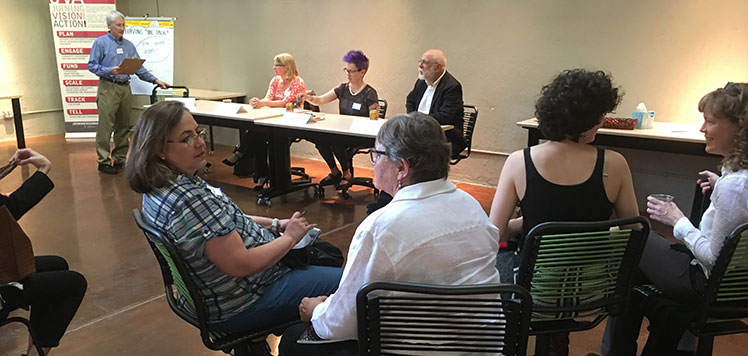By Silvia Solis, Qualitative Research and Evaluation Associate at Joining Vision and Action
How to Speak with Someone on the Other Side of the Political Spectrum
Conversations are complex human dynamics at all levels. A casual interaction with a passing stranger at the grocery store, small talk with a new colleague at work, and a heated discussion with family at the dinner table are all communication exchanges that require a certain level of emotional involvement and intellectual stamina, be that low or high. In the political environment Americans live in today, however, the intellectual stamina and emotional involvement required to have a conversation with someone at the other end of the political spectrum goes to a whole other level. Talks with strangers, colleagues, friends, and family members who do not share similar political views can hastily turn into passionate head-on confrontations that can threaten the thin strand on which vulnerable, important, and sensible relationships hang.
In an effort to come up with and provide useful communication tools to equip those who day by day deal with these sorts of exchanges, JVA brought together a group of experts to brainstorm with all those interested in the matter at the monthly networking talk.
We’ve compiled a few tips that we hope can help you turn difficult, if not impossible, conversations into possible, hopefully successful ones… at some point.
Find common ground.
Is there something you share with this specific person that can bypass the differences? It’s true that the instances of finding something impactful enough will be few and far between, but it’s worth the shot.
Lead with the sentiment, but present the facts.
Passionate and intense conversations can be taxing for most of us. When engaging with someone with whom you are not willing to go through a whole heated discussion, it is healthy and necessary to honestly express your stance. Make it clear that it is not a good time to speak about the subject or that you simply do not want to talk about it. When, however, you are willing, wanting, or simply can’t help but engage, present useful and true information that can back you up. Become a strong persuader, not just a loud opinion giver.
Listen to learn.
Listening to respond is not the same as listening to understand. While our own experiences are valid, those of other people are just as valid in their eyes. The things that have happened to us and those around us inform our understanding of the world, and this applies to everyone. Empathy is a real and important quality to practice. There are many things the person you’re in conversation with is not explicitly saying that color the way they perceive the situation. Listen to the story behind the story; listen to the subtleties that truly speak of what’s behind a point of view. Be curious about the reasons why a person thinks the way they think. You might know all about the reasons you voted one way or the other, explore those the other person had.
It’s not all about a win.
Is it more important to get your win or keep the peace? There are times to stand up for your beliefs and make your stance, true. But is it worth it when doing so creates conflict among loved ones or people you care about? The satisfaction of winning an argument is not necessarily the greatest satisfaction of all. Wouldn’t it be great for other people to always be the bigger person and avoid conflict altogether? Maybe try being the bigger person every once in a while. It’s not all about the discussion; sometimes it’s about the relationship.
Speak through your actions.
Are you craving to be heard, for people to listen to what you have to say, to feel understood? Chances are the person in front of you feels the same way. Many times during discord we ask from other what we ourselves are not willing to give. Not every conversation will be fixed once you put in the effort, but at least you will be half way there. There’s a phrase in Spanish that says: “atrapas mas abejas con miel que con hiel”, which roughly translates to: “you can trap more bees with honey than with vinegar”. There are more chances that someone will want to listen to a person who knows what they’re talking about, not because of what they say, but because of how they say it.
While practical, conversational shifts can take a difficult encounter a long way, what create the most profound effects in such sensible conversations are the shifts in approach and perceptions. One needs not alter one’s values and principles to realize what is most important in relationship with others, which many times is the relationship itself. In an environment where such tensions are tearing us apart, I think it’s safe to say we are beyond merely utilizing information to speak for us. Numbers, data, examples, and experiences can take us just so far before they lose all meaning for someone whose worldview is so far-removed from our own. When mere information and communication techniques fail us, our humanity can spare us. That is in the end the one thing we all have in common and the one thing that can see beyond all differences and imperfections. It is the ultimate thing that, when all else falters, we can hang on to for the sake of ourselves, others, and us all.







Leave A Comment